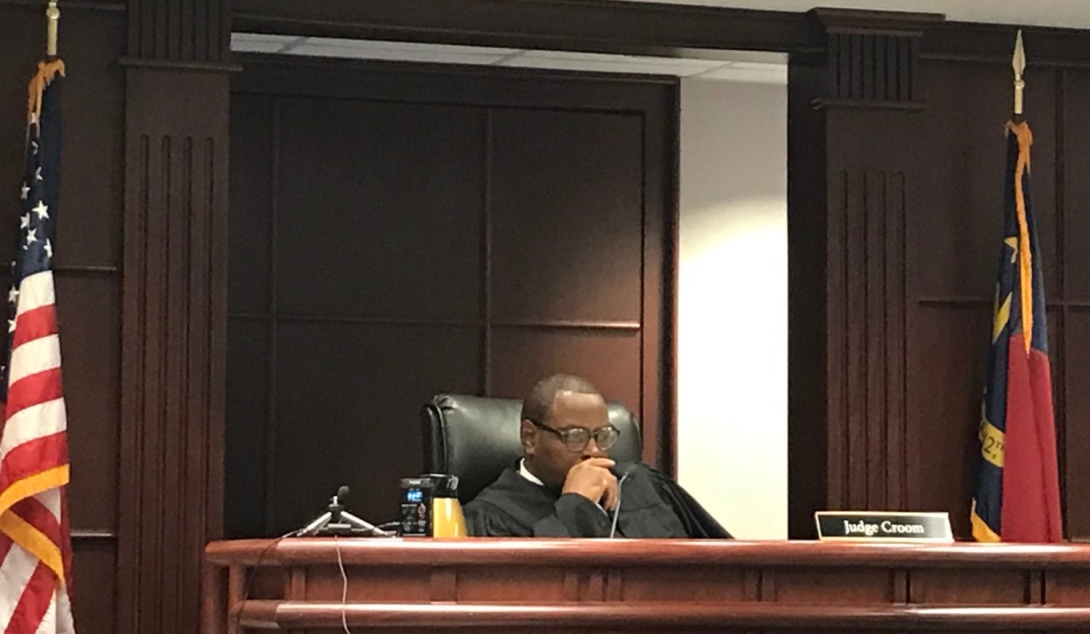NC judges asked to speed up trial over 'racially segregated' judicial elections

Judge Craig Croom listened to arguments in a racial gerrymandering trial this week in a Raleigh, North Carolina, courtroom. (Photo by Billy Corriher.)
In recent weeks, North Carolina judges have moved swiftly to order the legislature to redraw election districts that were gerrymandered to benefit Republicans. Now, the plaintiffs in a racial gerrymandering lawsuit want a North Carolina court to swiftly get rid of judicial election districts that they say discriminate against black voters.
Last year the N.C. General Assembly divided Mecklenburg County, which includes the Charlotte metropolitan area, into subdistricts for elections to District Court. The complaint says that three of the eight districts are more than 70 percent white, and four of the districts are more than 60 percent non-white.
In countywide elections in 2016, the candidates supported by black voters won all the county's contested District Court elections. The complaint notes that last year "six white persons won election, and only two black persons won election."
The plaintiffs argue the districts violate the state and federal constitutions, as well as the Voting Rights Act, by discriminating against black voters. Retired N.C. Court of Appeals Judge Robert N. Hunter, who was a Republican appointee, is representing the plaintiffs.
At a hearing on Monday, Hunter asked a judge to order the state to not use the districts for the 2020 elections, calling the districts "horribly segregated." But Judge Craig Croom, who served as a District Court judge until being appointed to the Superior Court last year, ruled that he lacked jurisdiction to issue the order.
Croom said a three-judge panel would be appointed to hear the case, and the courts were aware that "time is of the essence." Candidates are supposed to begin filing for next year's election on Dec. 2. Recently, a North Carolina court hearing a partisan gerrymandering case postponed filing for congressional elections while it weighs the legislature's recently redrawn election districts.
The legislators defending the judicial redistricting law denied drawing districts based on race. In briefs filed with the court, the defendants included an affidavit from former state Sen. Dan Bishop, now a Republican member of Congress, in which Bishop said he told his staff not to use racial data in drawing the maps. Former state Rep. Justin Burr (R), who spearheaded the redistricting effort, also denied claims that those drawing the maps were discriminating against black voters or black judges.
In 2017, Burr proposed maps that would redraw judicial election districts across the state. A legislative aide reportedly told a group of judges that the goal of the proposal was to get more Republican judges elected. One of the maps would have "double bunked" more than half of North Carolina's black district court judges, placing them in a district with another incumbent.
Documents recently found on the hard drives of Thomas Hofeller, the deceased GOP redistricting expert, suggest that Hofeller may have been involved in drawing the districts. According to journalist David Daley, a senior fellow at FairVote, Hofeller's hard drives contained drafts of the judicial redistricting maps, and those maps included racial data.
The Hofeller files will become public soon, thanks to a recent North Carolina state court ruling. They could shed light on whether voters in Charlotte's judicial elections were intentionally divided along racial lines.
The N.C. Constitution states that no one "shall be denied the equal protection of the laws" and that no one shall be "subjected to discrimination by the State because of race, color, religion, or national origin." The N.C. Supreme Court has interpreted this right in the same way as federal courts interpreted the Equal Protection clause of the 14th Amendment.
The U.S. Supreme Court has ruled that redistricting plans which discriminate on the basis of race violate the 14th Amendment. The Voting Rights Act prohibits election districts that dilute the political power of voters of color.
The defendants may argue that the federal claims should be heard by a federal court, but all defendants have to agree to move a case from state court to federal court. One defendant is the N.C. Board of Elections, which was appointed by Democratic Gov. Roy Cooper. The governor himself was dismissed from the case this week.
Judge Croom declined to throw out the plaintiffs' claims that the judicial redistricting bill violates other provisions of the N.C. Constitution, which outlines the legislature's power to create courts and requires that laws governing courts be "uniformly applicable."
The state Constitution also requires judges to reside in the districts where they preside, but the 2018 law goes further and requires Charlotte judges to live in a specific subdistrict. Moreover, the plaintiffs cite a state law that requires every judge to be elected by voters in the "district in which he or she is to serve."
The legislative defendants are represented by attorney Thomas Farr, a Trump judicial nominee who wasn't confirmed after public opposition from Tim Scott of South Carolina, the sole African-American Republican member of the U.S. Senate. The nomination of Farr, who has defended the legislature in other gerrymandering cases, came under fire for his deep connection to a white supremacist lawyer and his role in crafting the state legislature's discriminatory 2013 voter ID law.
Tags
Billy Corriher
Billy is a contributing writer with Facing South who specializes in judicial selection, voting rights, and the courts in North Carolina.
